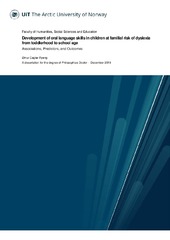Sammendrag
Previous research has shown that early oral language skills, including vocabulary and grammar, lay the foundation for later reading and writing ability and that children with poor oral language skills at the time of school entry are at heightened risk for later language and reading-related problems. Research focusing on the longitudinal development of lexical and grammatical skills in children born at familial risk of dyslexia together with the potential effect of home literacy environment (HLE) on these children’s oral language has been limited thus far. The current doctoral study therefore tracked a cohort of family risk children (FR) and their peers with no such risk (NoFR) from age 18 months up to the age of school entry (i.e., 6 years) and examined the growth of vocabulary and grammar skills and the possible effect of HLE on them. The study further examined whether and how these two core components of oral language are linked and interact with one another over time. Results showed that the two groups had a similar development in the earlier years. However, FR status seemed to have a significantly negative association with vocabulary and grammar scores at age 6 years, resulting in language outcomes in favour of NoFR children. Moreover, the results revealed that a proportion of FR children developed late emerging language difficulties by school entry, despite having typical language skills in toddlerhood. This was not the case in the NoFR group. Results further indicated that there were no significant between-group differences in the two HLE-related factors, book exposure and child’s own interest in reading. Book exposure, on the other hand, contributed to vocabulary skills by school entry only in the FR children. This association was mediated by lexical skills at age 4;6 years though, implying that exposure to books had a positive indirect effect on FR children’s later language development through its effects on early vocabulary knowledge. The current results together emphasise the importance of having a continuous focus on the development of oral language skills in FR children, particularly in the years preceding formal schooling. This may, in turn, contribute to early identification of language and reading problems and provision of timely intervention.
Har del(er)
Paper 1: Caglar-Ryeng, Ø., Eklund, K. & Nergård-Nilssen, T. (2019). Lexical and grammatical development in children at family risk of dyslexia from early childhood to school entry: a cross-lagged analysis. Journal of Child Language, 46(6), 1102-1126. Also available in Munin at https://hdl.handle.net/10037/17826.
Paper 2: Caglar-Ryeng, Ø., Eklund, K. & Nergård-Nilssen, T. (2019). School-entry language outcomes in late talkers with and without a family risk of dyslexia. (Submitted manuscript). Now published in Dyslexia, 2020, available at https://doi.org/10.1002/dys.1656.
Paper 3: Caglar-Ryeng, Ø., Eklund, K. & Nergård-Nilssen, T. (2019). The effects of book exposure and reading interest on oral language skills of children with and without a familial risk of dyslexia. (Submitted manuscript). Now published in Dyslexia, 2020, available at https://doi.org/10.1002/dys.1657.


 English
English norsk
norsk
